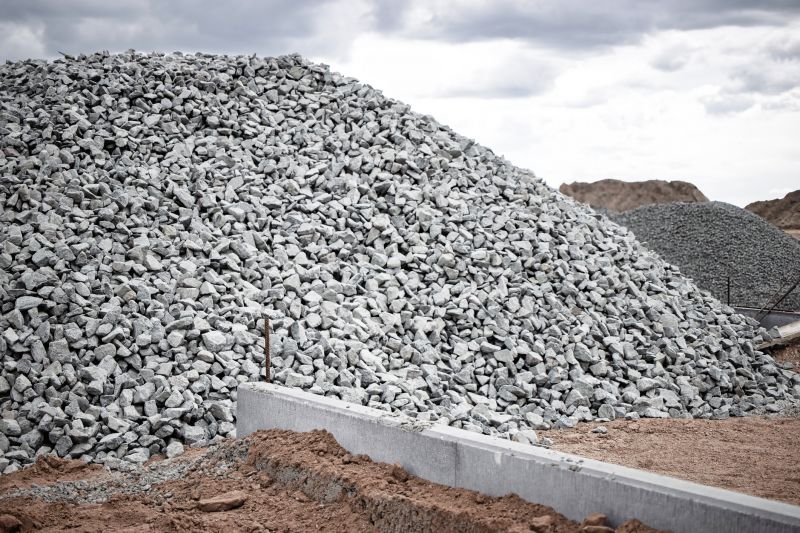Top-Rated Equipment For Seamless Gravel Installation Projects
Learn about the most effective tools and accessories that help achieve precise and professional gravel installation results.
 Installing gravel surfaces can be an effective way to create durable pathways, driveways, and landscaping features. The success of a gravel installation depends heavily on selecting the appropriate products and materials that ensure stability, proper drainage, and longevity. From foundational layers to surface finishes, the right combination of products can help achieve a functional and aesthetically pleasing result. Understanding the different types of products available can assist homeowners and professionals in making informed decisions for their specific project needs.
Installing gravel surfaces can be an effective way to create durable pathways, driveways, and landscaping features. The success of a gravel installation depends heavily on selecting the appropriate products and materials that ensure stability, proper drainage, and longevity. From foundational layers to surface finishes, the right combination of products can help achieve a functional and aesthetically pleasing result. Understanding the different types of products available can assist homeowners and professionals in making informed decisions for their specific project needs.
Top Overall Option
Comprehensive Gravel Stabilization System
A versatile gravel stabilization system that combines a permeable base layer, binding aggregates, and edge restraint components. This all-in-one solution is designed to enhance stability, facilitate drainage, and reduce gravel displacement, making it suitable for driveways, pathways, and landscaping projects. Its modular design allows for easy installation and adjustment, providing a reliable foundation for various gravel installation needs.
Types of Products For Gravel Installations
Crushed Stone Base Layers
Provides a stable foundation and improves drainage for gravel surfaces.
Gravel Edging and Restraints
Defines boundaries and prevents gravel from spreading into unwanted areas.
Geotextile Fabrics
Supports drainage and prevents weed growth beneath gravel layers.
Fine Gravel and Sand
Creates a smooth, level surface and fills gaps between larger aggregates.
Drainage Pipes and Accessories
Facilitates water runoff and prevents pooling in gravel areas.
Gravel Stabilizing Grids
Interlocking grids that lock gravel in place and add strength to the surface.
Weed Barriers
Suppresses weed growth and maintains a clean appearance.
Resin Bonded Gravel
Creates a solid, permeable surface by binding gravel particles with resin.
Landscape Fabric Underlay
Provides additional support and prevents soil erosion beneath gravel.
Leveling Rakes and Tools
Facilitates even spreading and leveling of gravel during installation.
Edge Restraint Systems
Secure the perimeter and prevent gravel from migrating outward.
Permeable Pavers
Alternative surface options that allow water passage while maintaining stability.
Popular Choices
Widely used for creating stable and permeable driveway surfaces.
Popular for defining pathways and garden beds with clean lines.
Commonly chosen for weed suppression and soil stabilization beneath gravel.
Favored for creating durable, smooth, and permeable surfaces in various settings.
Popular for paths and driveways that require gravel to stay in place.
Chosen for effective water management in gravel areas.
Commonly used to keep unwanted vegetation from growing through gravel surfaces.
Frequently selected to maintain clean edges around gravel installations.
A typical gravel installation begins with a solid base layer that provides stability and prevents shifting over time. This often involves using crushed stone or larger gravel aggregates that interlock to form a stable foundation. Over this base, finer gravel, sand, or specialized bedding materials are used to create a smooth, level surface. Edging products are also crucial to contain the gravel and maintain the shape of the installation. Proper drainage accessories, such as permeable membranes or drainage pipes, can further enhance the durability of the gravel surface by preventing water accumulation and erosion.
Maintenance and longevity of gravel installations can be improved with the right accessories and supplementary products. Weed barriers can help prevent unwanted plant growth, while stabilizing binders or resin products can lock the gravel in place, reducing displacement over time. Selecting products that are compatible with the specific type of gravel and the intended use of the area is essential for achieving the best results. Careful consideration of these factors can lead to a successful, long-lasting gravel surface that meets both functional and aesthetic goals.
Key Buying Considerations
- Determine the primary purpose of the gravel installation, such as pathways, driveways, or decorative features.
- Assess the load-bearing requirements to select suitable base materials and surface products.
- Consider drainage needs to prevent water pooling and erosion issues.
- Choose appropriate edging and restraint products to maintain the shape and prevent gravel migration.
- Evaluate the type and size of gravel or aggregates to match project aesthetics and stability needs.
- Decide if additional support layers like geotextile fabrics or stabilizing grids are necessary.
- Review product compatibility, especially if using resin-bonded or stabilized gravel options.
- Account for local climate and weather conditions that may influence material performance.
- Factor in ease of installation and whether professional assistance is needed.
- Budget for ongoing maintenance, including weed control and gravel replenishment.
- Check product durability and resistance to wear and displacement over time.
- Explore options for enhancing visual appeal, such as color or decorative gravel choices.
- Ensure that the selected products comply with local building codes and regulations.
- Consider environmental factors, including permeability and water management features.
- Research product reviews and manufacturer specifications to ensure quality and suitability.
